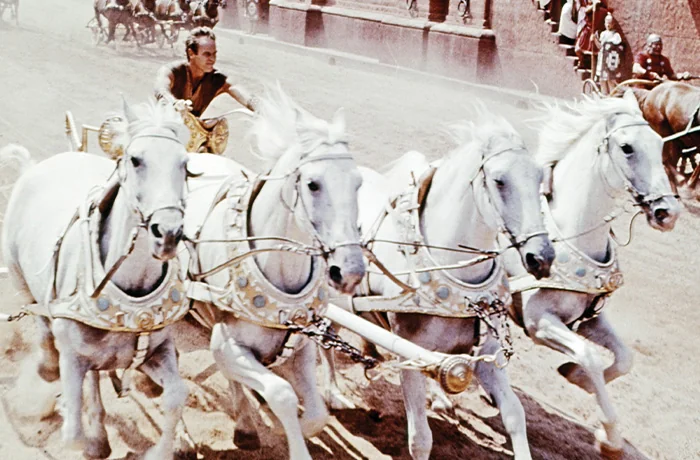I am part of the repertory cinema scene in Los Angeles, that lonely confederacy of men in graphic tees, paying for parking just to watch movies you could easily rent on Amazon. So I speak from both authority and trial and error when I say the David Geffen Theater at the Academy Museum of Motion Pictures, at the intersection of Fairfax Avenue and Wilshire Boulevard, and kitty-corner from where Biggie Smalls was gunned down in the street, is the finest in the city. Everything is red and blush and decadent, like the embrace of a Borgia cardinal. The screen spans your peripheral vision, veiled by a motorized curtain that is raised and dropped with reckless abandon, proving to us some inscrutable point. The splendor encourages self-governance: There’s no need for an usher to police phone use because you’d feel sacrilegious even in the attempt.
The trappings are all well and good, but I’ve been to stickier cinemas for worse films. What I’m here for are the epics. I am here watching my second Charlton Heston film in as many weeks. Every Sunday, the museum screens a film as part of its Oscar series, these past two weeks honoring the last hurrah of epics in Hollywood. The week prior was Cecil B. DeMille’s The Ten Commandments, followed the next Sunday by William Wyler’s Ben-Hur. Watching both 200-plus-minute films and comparing them in the mind to today’s fare, you wonder just how DeMille commandeered virtually the entire population of a neighboring suburb for the crowd scenes, and try not to wonder how many horses the Ben-Hur chariot race sent to the great glue factory in the sky.
Often, when someone brings up classic Hollywood with a sigh and says, “They don’t make ‘em like they used to,” what they are invariably referring to are movies they do, in fact, still make like they used to, and they’d know that if they’d turn off HBO. Biblical epics are where they prove me wrong. Not only do we no longer make them, we are no longer capable. For one thing, each of these features alone has the runtime of some Apple TV+ seasons. Expecting a modern audience with modern attention spans to sit patiently through would be considered enhanced interrogation in some jurisdictions. For another, computer-generated imagery is a devil technology intended to kill grandeur in the human heart. Most of the spectacle in these epics is knowing that everything you see is real, the old guard unable to cheat, not because of morals but because the proper cheating methods hadn’t been invented yet.

CGI increases our capabilities while limiting our horizons. We can now depict a crowd scene quadruple the size, but the screen feels emptier for it. Your eyes can lie to you, but your heart lacks the guile. The expanded capacities also push our movies to more outlandish subjects, when true spectacle needs a real human in frame for a point of emotional reference. It puts us in the odd situation where movies these days are about superhumans flying through space, yet they have the claustrophobia of a soundstage, whereas these films about two different Jews in the same desert feel larger than life.
Much, if not all, of that is owed to the presence of Heston. His grandiosity makes him easy to parody, and fun too. I myself annoyed a friend on the way in with my impression, stretching the word “God” sometimes into three syllables. He tolerated the first 12 minutes of this performance before finally informing me I was actually quoting John Wayne in The Greatest Story Ever Told. But Heston needs to be larger than life in these films, as grounding the spectacle around you requires putting it in a headlock and wrestling it into submission. There was something classical, even primordial, about Heston, even in comparison to the men of his generation. Both DeMille and Wyler scoot him back and forth across the widescreen, and every time he settles into a frame, it’s like something etched on a Grecian plate. These films simply don’t work without him. You picture even someone such as Marlon Brando in the beard, and you laugh into your fist.
Art is not a contest, even in a theater run by the cabal behind the Academy Awards, but one can’t help comparing the two side by side. Ben-Hur has the most accolades, including a record 11 Oscars. But even as a Christian, I can’t help but prefer the knockoff Count of Monte Cristo parts to the Sunday school lessons. You are lured in with pirates and the most incredible chariot race captured on film, never remembering the 45 minutes of Ben-Hur staring forlornly into a cave. My fellow moviegoers jolted to life whenever the wicked Messala reappeared — it seems his catty hatreds translated more easily to the LA crowd than the triune mystery.
Personally, I can’t help preferring The Ten Commandments, if only because DeMille was a vulgarian after my own heart. He has enough ego for majesty but can’t shake off his old-school entertainer instincts, so he will also throw in some never-redundant scenes of dancing girls, or his camera will get distracted by camels acting silly in a camel manner. You feel the safety of a man who endorses his own product, like a spy who pours himself a drink to prove the mixer isn’t poisoned. As the pea-green fog of death crept down the streets of Cairo, I felt a stirring of something unfamiliar, only to realize it was giddiness.
RYAN COOGLER AT THE CROSSROADS
The 4K edition was also immaculate, capturing a vibrancy of color we lost when we betrayed lead paint. The definition and the screen size did leave me to wonder, not for long, if we were seeing more of Anne Baxter than she intended. An elderly Jewish woman sat in the row ahead of me, and every time the Israelites got one over on the stinkin’ Pharaoh, she would clap her hands together in a flurry of excitement. Her enthusiasm proved too infectious to resist, and I too began rooting for the home team.
The retrospective is now over, the Academy now moving on to a longer series on queer cinema. Still, I have smuggled that giddy feeling out of the theater with me. It was with me through the extortionary parking garage, past the smattering of bouquets still laid on the corner of Wilshire and Fairfax. Even now, as I type, I try to stretch God into a fourth syllable and find myself chuckling.
Joe Joyce is a writer. Follow him on X at @bf_crane.























